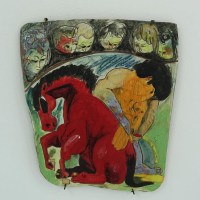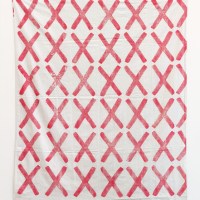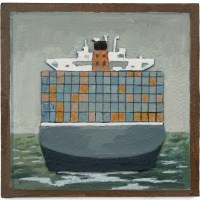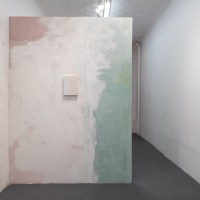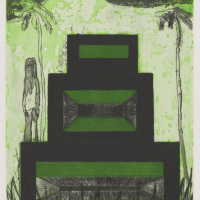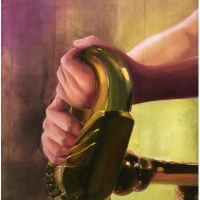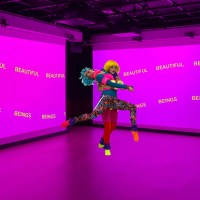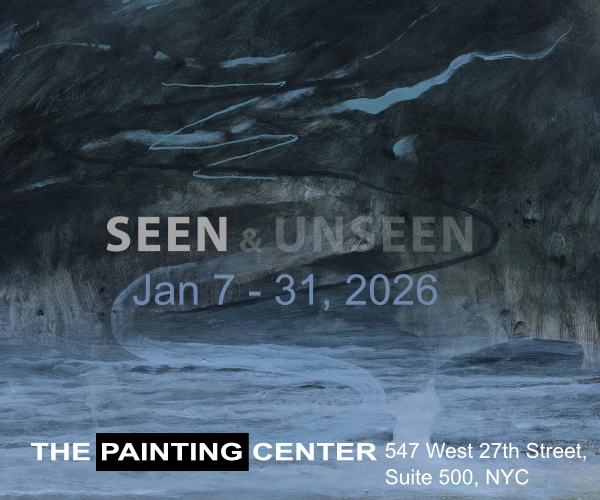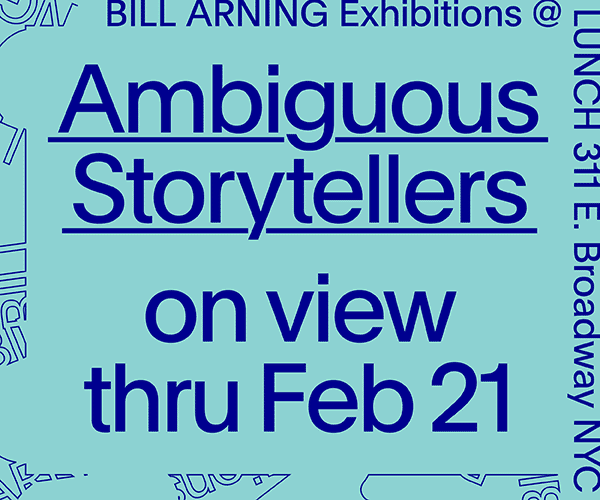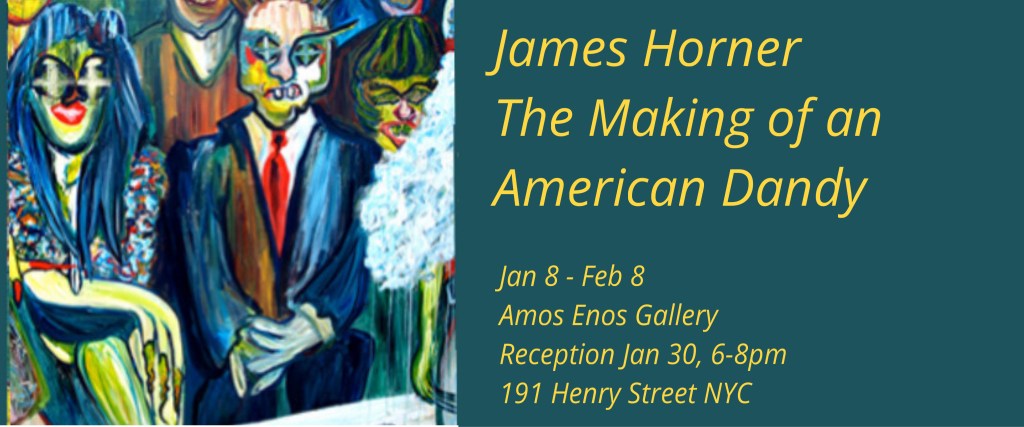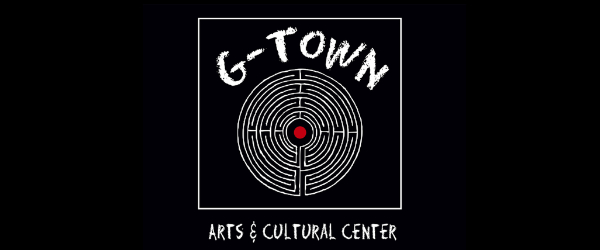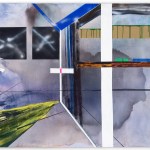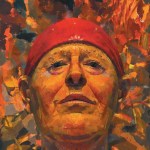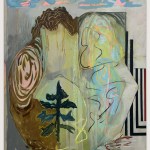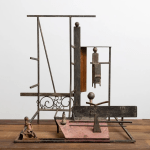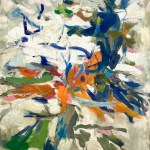Contributed by Mary Jones / The old joke begins, “A horse walked into a bar…” That could be one of the titles of the 15 new ceramic pieces in Noa Ironic’s lively show, “The Good Chyna,” now up at bitter.nyc. Ironic’s horse, however, would be high on ecstasy. Fantasy and desire abound as she negotiates identity, social anxiety, memory, and a little poker. “I like oversharing,” she says. Ironic’s work explores gender, and particularly masculinity, and in “The Good Chyna” she proves a prescient and empathetic observer.
Latest articles
Liz Ainslie’s masterful oscillations
Contributed by Jason Andrew / There is a bound wildness to Liz Ainslie’s new paintings at Deanna Evans Projects. Across 18 paintings, three of which are over six feet tall and the largest she’s made to date, Ainslie introduces an eclectic menagerie of loops, halos, and squiggles penned in by stripes, checkerboards, and color fields. The works are beguiling hybrids of perception and abstraction in their pursuit of free-form reverie with formal discipline.
Shirin Mirjamali’s exquisite intensity
Contributed by Jonathan Stevenson / The Iranian government has looked askance at political assertiveness and social progressivism since the revolution of 1979. The pressure under which women operate is especially heavy. Political protest, however, cannot be a way of life. Day to day, Iranians are compelled to avoid confrontations that could place them in jeopardy, discreetly acknowledging anguish and resolving to sublimate it. Shirin Mirjamali, whose exquisitely intense works on paper are now on display in her solo show “Hidden Longing” at Anita Rogers Gallery, exemplifies this essentially pensive disposition.
The enduring resonance of Supports/Surfaces
Contributed by Marjorie Welish / The group show “Fold, Drape, Repeat” now up at Ceysson & Bénétière does what it says. A select showing of work by the loosely aggregated French collective Supports/Surfaces, the exhibition embodies the very assembly involved in making art. Offbeat maneuver never succumbs to product or merchandise. Put another way, each individual artist emphasizes how the construction of art respects the commonplace materials at hand.
Richard Bosman at Headstone Gallery
Contributed by Bill Arning / Long-time Bosman watchers often recall his work as a firehose of imagery—gunfights and car chases, sinking ships, kidnappings, and robberies pouring out in rapid succession. Fans might therefore be surprised when entering his first solo show at Kingston’s beloved Headstone Gallery, a venue known for its ambitious program of younger artists. In inviting an older master like Bosman, the gallery has delightfully broadened its scope.
Jodie Manasevit’s minimalist portent
Contributed by Michael Brennan / Until viewing the concurrent exhibitions up now – one at Mario Diacono Gallery in Boston, the other at Ghostmachine in New York – the last time saw I so many of Jodie Manasevit’s fine, fierce paintings was at the start of 2020, in a previous incarnation of artist-curator David Dixon’s Cathouse Proper project space in Carroll Gardens.
Fran Shalom: Merging vernaculars
Contributed by Adam Simon / I’ve been aware of Fran Shalom’s paintings for a while and have been interested in how at times they seem like a comic version of abstract painting. She excels at what I would call formal wit, eliciting not a belly laugh but a knowing smile from those familiar with the vernacular. Her humor is a foil of sorts, providing cover for a serious investigation into the way shapes can carry associations and embody feelings. Looking at one of Shalom’s paintings can be as psychologically charged as an encounter with an eccentric person. My assumption is that the paintings are arrived at, as the title of her current show at Kathryn Markel Fine Arts, “Everyday Improvisations,” suggests, through trial and error.
Peter Doig’s tropical opera
Contributed by David Carrier / Upon entering Peter Doig’s show at Serpentine South Gallery in London, you see Painting for Wall Painters (Prosperity P.o.S.), a vibrant depiction of a half-finished mural he photographed in the Port-of-Spain, Trinidad and Tobago’s capital city. If Henri Rousseau had actually gone to the tropics, and they had inspired him to intensify his pigments, he might have painted something like Doig’s three large-scale works, which feature sensuous, saturated colors depicting the Lion of Judah, a Rastafarian symbol, freed in the streets of the city.
Sharon’s Substack / November 5, 2025
Contributed by Sharon Butler / If you follow me on Instagram, you probably noticed that the new paintings have been stacking up in the studio […]
Alexandra Smith’s poignant restraint
Contributed by Jacob Patrick Brooks / Auxier Kline is a small hallway gallery on the fringes of Chinatown. Alexandra Smith’s previous shows there had an intimate sweetness – tender images of touch, flesh rendered in unnatural pinks and yellows, hands everywhere, faces rarely shown. “Doppelganger,” Smith’s current show in the gallery, turns into darker territory. Overall, the mood is creeping dread – a sense that “something bad is going to happen, probably to me.”
Michelle Jaffe’s multi-sensory encounters
Contributed by Susan Silas / Sculptor and inter-media installation artist Michelle Jaffe creates time-based experiential works at the intersection of sculpture, sound, video, and performance. Sound has been the connective tissue of her work since 2003. Susan Silas is a visual artist working in video, sculpture, and post-photographic media. Her primary subject for the past 30 years has been embodiment. From that perspective, she talked with Jaffe about her video-and-sound installation GRIFTER’s Gambit.
NYC Selected Gallery Guide, November 2025
Welcome to the Two Coats of Paint November selected guide to painting-centric exhibitions in New York, Brooklyn, and Queens….
Hudson Valley (+ Vicinity) Selected Gallery Guide November 2025
Contributed by Karlyn Benson / November is starting out with a busy weekend of openings all across the region. On November 1, Dogs & Cats opens at SEPTEMBER with over 80 artists participating. 10% of all sales are being donated to the Columbia County Sanctuary Movement, a local organization committed to supporting and resourcing immigrants. Richard Boseman opens on Saturday, November 1 at Headstone, and in the Catskills…
Andrew Shea’s domestic enchantment
Contributed by Jonathan Agin / Andrew Shea’s work in recent years has evolved from geometric, high-contrast scenes of city bustle to impressionistic vignettes of home life where hues interact with considerably more freedom. Steeped in a quiet domesticity, the paintings in “Grocery Slips” at JJ Murphy Gallery seem idealized only at first glance…
Spring Projects’ epic subway series
Contributed by Jonathan Stevenson / Most New Yorkers couldn’t live without the subway. It is their savior if occasionally their oppressor. They love it so much that they hate it when it lets them down, but the opprobrium is often oddly affectionate. Barroom arguments have fulminated and flourished over which subway line is worse – the F or the 7, the 2 or the L. Patronizing the subway can be a point of gritty cosmopolitan pride: real New Yorkers don’t use Uber. And it’s a great social equalizer, as reflected in Ralph Fasanella’s 1950 folk-art painting Subway Riders, now ensconced in the wall of 53rd Street/Fifth Avenue Station and as idealistic as ever. “Subway Riders” the group show is now up at Springs Projects. It keenly captures the subway’s pervasive, multivalent thrum through New York life with work by over 100 artists and a few eager amateurs (one is me).

